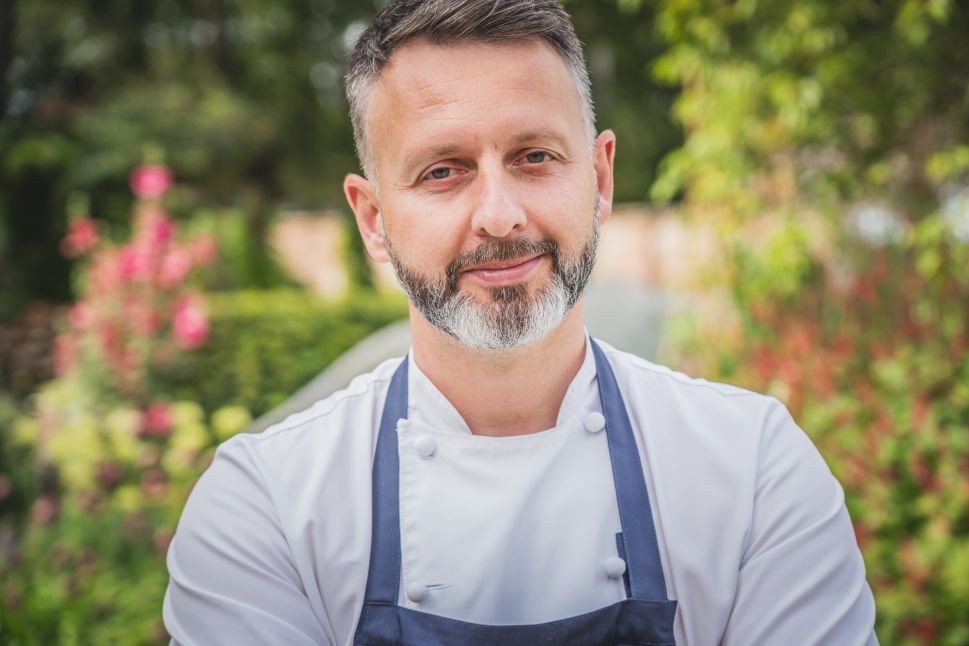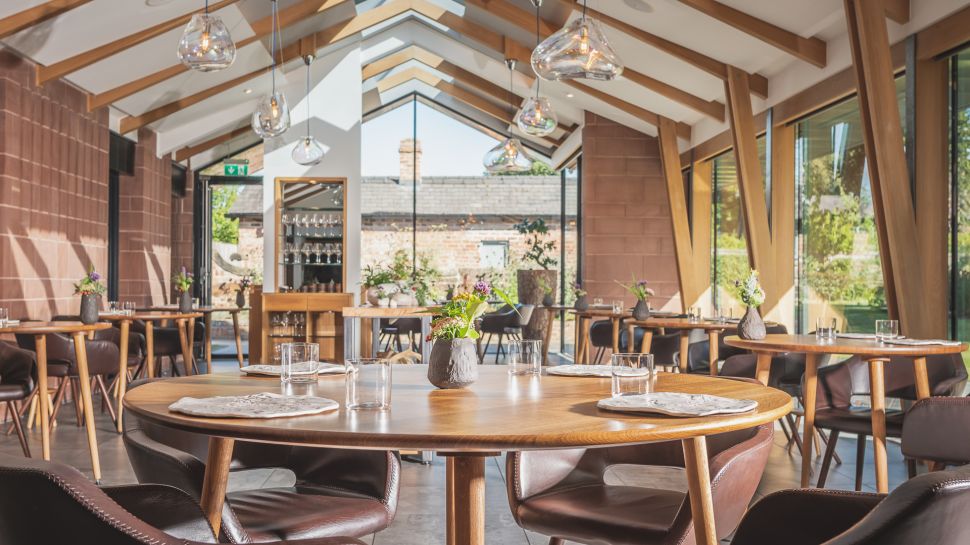
At Moor Hall, the meal is about the journey. But visiting the elegant English countryside compound is also very much about the destination. Located in the village of Aughton, in the picturesque Lancashire countryside, Moor Hall has established itself as a British culinary mecca, an identity that was augmented earlier this year when it received its third Michelin star. For chef Mark Birchall, creating that sensibility has been a constant progression since Moor Hall debuted in 2017.
Birchall, formerly the chef at Simon Rogan’s L’Enclume in Cumbria, partnered with investors Andy and Tracey Bell in 2015, and spent nearly a year looking for the right site. He was attracted to Lancashire because it’s where he grew up, but he wasn’t sure what the actual site would look like. They visited derelict village pubs and old barns before eventually happening upon Moor Hall, a grand Grade II-listed estate dating back to 1282. The current manor house was built in 1533, and its history is still evident in the building, although it took a lot of work to transform it from a private home to a fine dining outpost.
“At the time of the first viewing, I wasn’t too sure,” Birchall tells Observer, speaking from the restaurant’s private dining room in late April. He’s soft spoken and humble, despite Moor Hall’s many accolades, which include a green Michelin star for sustainability. “I thought the building was a little bit dark, maybe too old,” he admits. “But on the second visit, I could start to visualize what we could do with the building, where we could put a restaurant, how we could get planning for an extension. I could visualize what we could do with the gardens.”

When I arrive at Moor Hall on a sunny day in late April, many of Birchall’s imaginings have come to life. The original manor house has been expanded to incorporate the light-filled dining room and high-end kitchen. The gardens are immaculately planted and kept, with several greenhouses and beds of produce and herbs. Fourteen newly-opened luxury hotel rooms surround a small lake, a welcome respite from the buzz of London I’ve come to escape. The former barn has since been converted into the appropriately-named The Barn, a one-Michelin-star restaurant where overnight guests of Moor Hall are invited for breakfast. Soon, the private dining room will be revamped in partnership with Macallan whisky. There are hopes of additional growing fields for ingredients like potatoes, or even hazelnut trees inoculated with truffle spores.
It’s a significant responsibility for someone who originally signed up solely as the chef. “There are two restaurants I’m responsible for, and it’s a lot of work,” Birchall says. “We’ve got the bedrooms. It’s been a lot to take on. I enjoy it when it’s going well, especially when the weather is nice like this.”

The menu continues to evolve, although Birchall doesn’t change things simply to change them. Some of the dishes have been part of the tasting experience since the restaurant first opened, including the carrots served with Doddington cheese, the turnip and crab dish and the aptly-balanced aged beef tartare (my personal highlight). “They are far superior to what they were when we first opened and we got our initial star,” Birchall notes. “We just try to keep refining. We’ve had different textures on the carrots. The presentation has changed. The plate itself was fired [in a kiln] with byproducts from the kitchen to give it the right look.”
What hasn’t changed is Birchall’s ethos, who says he has always wanted to “start with produce from our doorstep and work our way out.” That can mean ingredients from Moor Hall’s garden or strawberries from a nearby purveyor. The lobster comes from North Yorkshire and the guinea hen from Saint-Sever, France, but Birchall is generally focused on Lancashire and what the region has to offer.
“I’ve consciously made an effort not to move the goalposts of how we work and the philosophy of the restaurant,” he says. “That’s all down to the produce. I want to keep a clear direction for myself and the team. I’ve really stuck with things. And especially through quieter times and difficult periods, I have been a bit stubborn. But I am stuck to what I want and what I know. It’s the only way to keep moving forward properly.”

At Moor Hall, lunch and dinner are presented as a tasting menu. (Lunch starts at £125 per person, the Provenance menu starts at £235 per person.) But it’s far more involved than simply sitting down for a meal in the dining room. The experience begins in the lounge, located in the old part of Moor Hall, where wooden beams traverse the ceiling and the fireplace reveals several eras of history in its layers. Snacks are served alongside drinks and presented with artistic flair. One, a warm bite of black pudding, pays tribute to Lancashire, where the dish is from. Another invites guests to spread aged Kaluga caviar onto homemade crackers decorated with herbs and flowers from the garden.
Despite the sunshine, it was still cold when I visited, so my dinner continued via the kitchen, where the final snack was served. But in warmer months, Birchall invites guests through the garden and then into the kitchen. “We’re trying to give that nice journey through the whole place,” he says. “So by the time you arrive at the table, you’re already blown away.” The core of the meal, a succession of dishes, is perfectly paced and showcased with some tableside flair. Those who opt for a cheese course (I was too full) get to visit the refrigerated cheese room. The third dessert is offered back in the lounge, completing the culinary journey. “You need to feel the crescendo,” Birchall notes.
The stop in the kitchen on the way to the table is purposeful—not just to delight guests, but also to inform them. When I visited, the countertop was piled with the ingredients that would comprise the meal: lobster, carrots, beets, asparagus, rhubarb, oysters, caviar, preserved ginger and more. For Birchall, who greets each diner personally, it’s a way of creating a visual link between ingredient and dish. “It’s about that connection,” he says. “You might walk through the garden and see radishes growing. And then when you see it on the plate, those are the radishes from the garden. It’s lovely to connect that for people.”

Birchall also draws the local culture into the menu. Between the savory courses and the desserts, the chef presents an artful gingerbread ice cream, which is actually shaped like a piece of ginger. It pays homage to the adjacent town of Ormskirk, a locale known for its history with gingerbread dating back to the 17th century. “That’s another dish that has been on the menu from the start,” Birchall says. “It started off as a bowl of ice cream with these little sugar strands on the top and the candied fruits underneath. There’s not actually any gingerbread in the dish. Now we use candied root vegetables, pine and spruce to create that flavor profile along with the ice cream.”
For those who stay overnight in one of the rooms, the journey continues after you wake up. Breakfast is served in The Barn as a mini tasting menu, and it is as thoughtful as everything offered the night before. It’s almost too much food—emphasis on almost—and it augments the scope of what Moor Hall is doing with ingredients. There’s also some requisite black pudding alongside a sculptural eggs Benedict that looks like something out of a contemporary art museum. This is all in addition to the afternoon tea service that arrives to the room shortly after check-in, a charming element.
“We want to make you feel like you want to come back,” Birchall says. “And when you’re here, you don’t want to leave. When you come somewhere like this it should feel like it’s got value. All restaurants are expensive—everything’s expensive now—but you want to feel like you spent well and it was worth it, regardless of whether it has no star or three stars.”

That coveted third star has, of course, made an impact on Moor Hall. England has very few three-Michelin-starred restaurants outside of London, and even fewer in the north. Aughton has five Michelin stars and only 8,000 residents, a huge achievement for a village located hours away from the culinary capital. “It doesn’t feel like we’re in the middle of nowhere because we’re close to Liverpool and Manchester, but to have three stars up here was unheard of,” Birchall says. “The attention that’s happening away from London over the last ten years has been amazing.”
Still, the chef acknowledges that things aren’t that much different from when Moor Hall had two stars. “I’m seeing my family less, and we’re a lot busier,” he says. “There’s been a lot more attention, including international attention. But life hasn’t really changed. The restaurant is the same. The food is the same.”

From the outside, Moor Hall’s trajectory to a highly decorated restaurant appears seamless. But it’s been what Birchall describes as “bloody hard work,” especially with the interruption of the pandemic. And despite all of the awards and the stars, the chef feels like this is only the beginning of a longer story, much like Moor Hall’s original building.
“Eight years old is nothing for the age of a restaurant,” Birchall says. “It is absolutely nothing. This was just a home before, so we’ve literally come out of nowhere. And I think we’ve got a long way to go.”